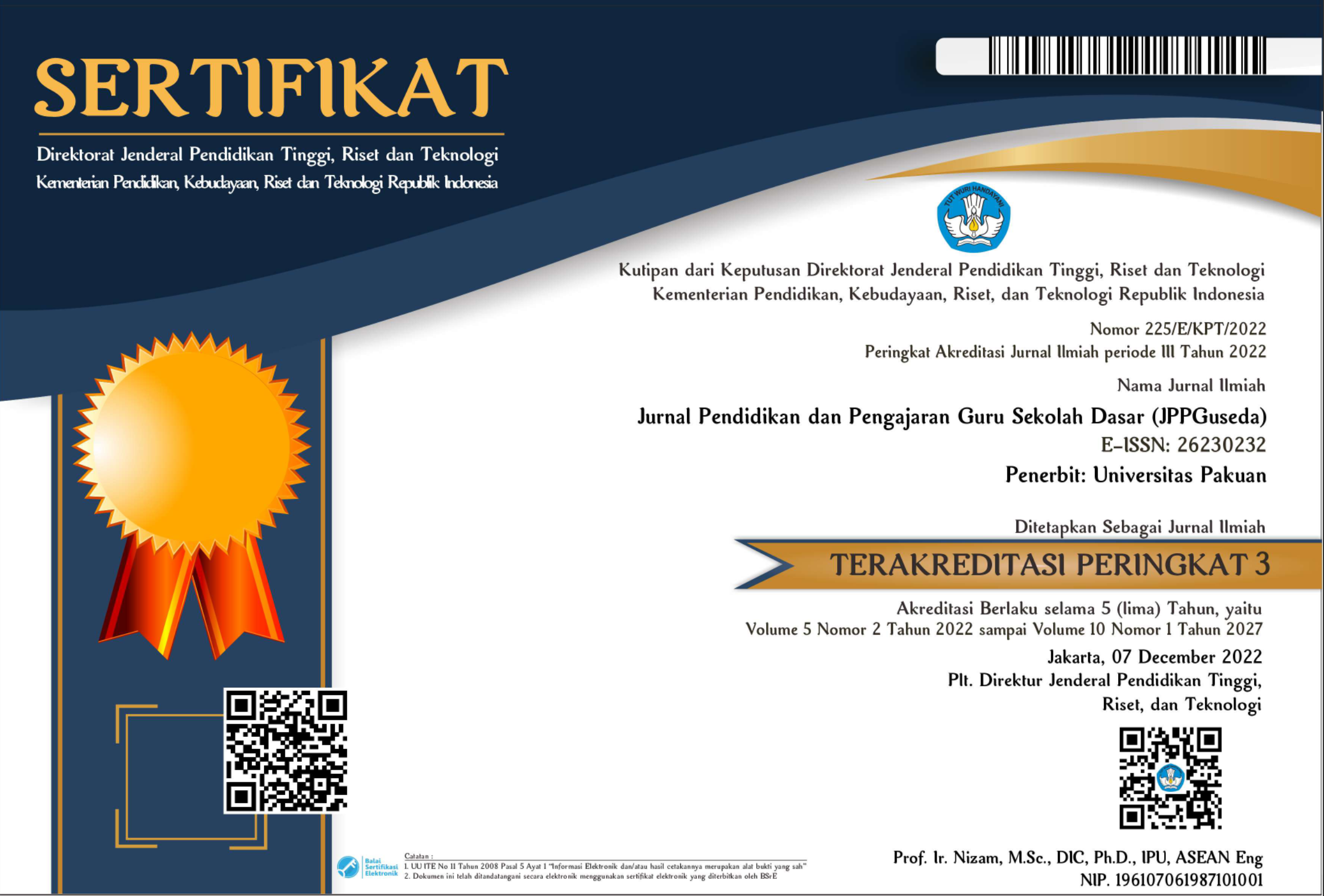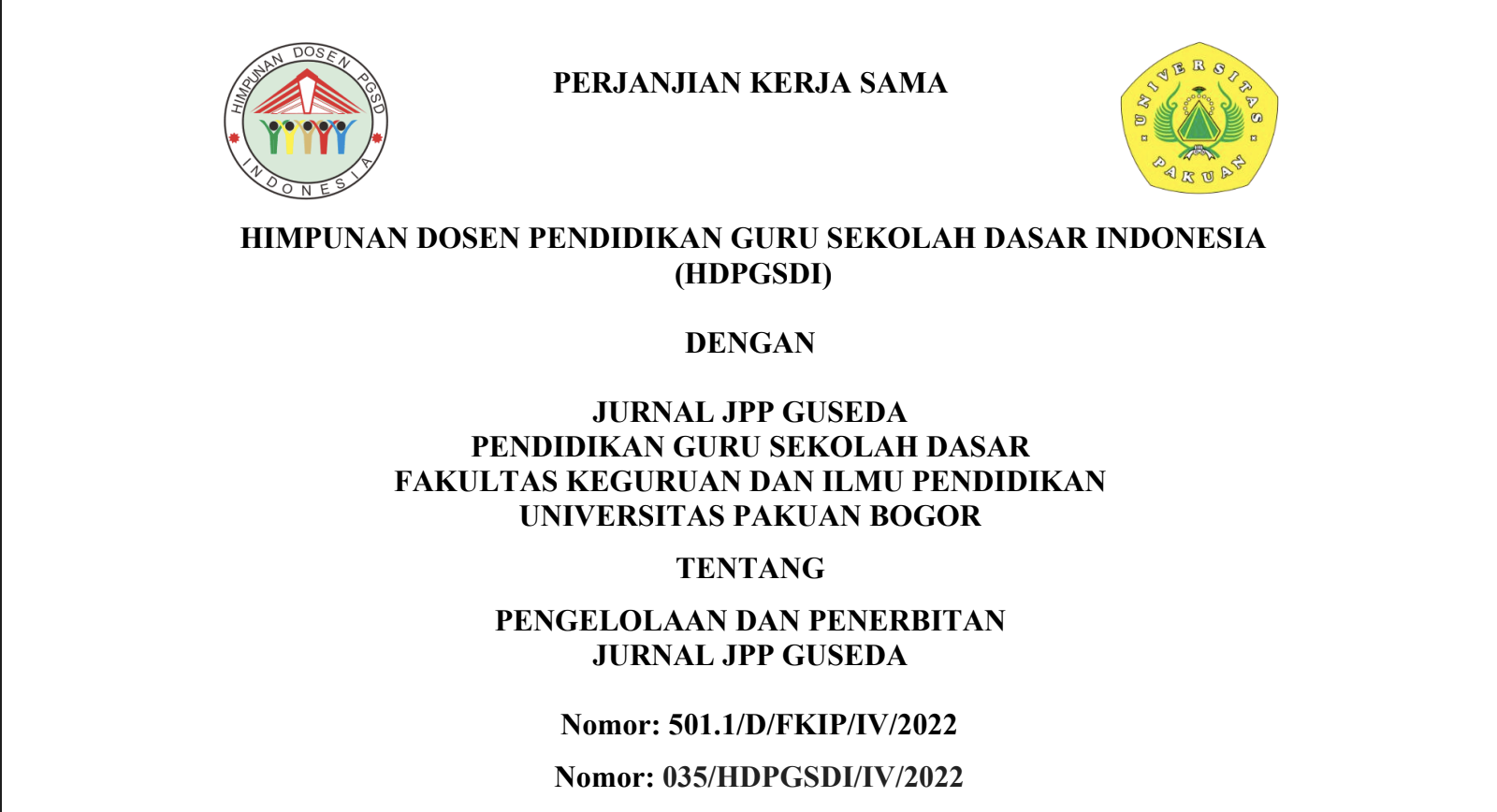HUBUNGAN ANTARA KONSEP DIRI DENGAN DISIPLIN SISWA
Abstract
Keywords
References
[1] Monawati. 2016. “Hubungan Antara Kedisiplinan Terhadap Hasil Belajar Siswa Kelas V Di SD Negeri 10 BandaAceh”Jurnal Ilmiah Mahasiswa Prodi PGSD. Vol.1 (1).
[2] Ambarwati. 2016. “Hubungan Konsep Diri dengan Interaksi Sosial Siswa Kelas IV SD” Jurnal Pendidikan Guru Sekolah Dasar. Vol.1(4). h.927.
[3] Surya, Mohamad. 2010. Landasan pendidikan. Bogor: Ghalia.
[4] Naim, Ngainun. 2012. Character Building Optimalisasi PeranPendidikan dalam Pengembangan Ilmu & Pembentukan Karakter Bangsa. Jogjakarta: Ar-Ruzz Media.
[5] Imron.2012.Manajemen peserta didik berbasis sekolah. Jakarta: Bumi aksara.
[6] Suryadi. 2007. Cara efektif memahamiperilaku anak usia dini. Jakarta: EDSA.
[7] Fadlillah.2013.Pendidikan Karakterusia dini. Jogjakarta: AR-Ruzz media.
[8] Anitah, Sri. 2007. Strategi Pembelajaran di SD. Jakarta: Universitas Terbuka.
[9] Agustiani. 2009. PsikologiPerkembangan. Bandung: Refika.
[10] Dariyo. 2007. Psikologi Perkmbangan. Bandung: Refika.
[11] Surya, Moch. 2013. Psikologi GuruKonsep dan Aplikasi. Bandung: Alfabeta.
[12] Rakhmat. 2011. Psikologi Komunikasi. Bandung: Remaja
[13] Ubaedy. 2013. Total confidence. Jakarta: Bee Media Pustaka.
[14] Desmita. 2016. Psikologi Perkembangan Peserta Didik. Bandung: Remaja
[15] Novilita. 2013. “Konsep Diri Adversity Quotient dan Kemandirian Belajar Siswa” Jurnal Psikologi. Vol.8(1).h.619-632.
[16] Budiarnawan. 2014. “Hubungan Antara Konsep Diri dan Pola Asuh Orang Tua Terhadap Hasil Belajar IPA Siswa Kelas V SD Di Desa Selat” Jurnal Mimbar PGSD Universitas Pendidikan Ganesha. Vol. 2(1).
[17] Yasmin. 2016. “Hubungan Disiplin dengan Tanggung Jawab Belajar Siswa” Jurnal Pendidikan.Vol.1(4).h.i.
[18] Zainidar. 2017. “Hubungan Disiplin Belajar Terhadap Hasil Belajar Siswa Kelas IV Sekolah Dasar Negeri 18 Banda Aceh” Jurnal Ilmiah Pendidikan Guru Sekolah Dasar. Vol.2(1).h.i.
[19] Rachmawati. 2014. “Hubungan Disiplin Belajar dengan Hasil Belajar Siswa Pada Mata Pelajaran PKN Di Sekolah Negeri Sumber Jaya 04 Tambun Selatan Kabupaten Bekasi”. Pedagogik. vol.2 (2). h.i.DOI: 10.55215/jppguseda.v2i1.992
 Abstract views : 2142
Abstract views : 2142
Refbacks
- There are currently no refbacks.
Copyright (c) 2019 JPPGuseda | Jurnal Pendidikan & Pengajaran Guru Sekolah Dasar




















